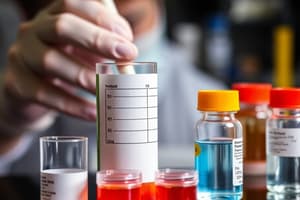Podcast
Questions and Answers
What is the primary role of a forensic scientist in criminal investigations?
What is the primary role of a forensic scientist in criminal investigations?
- To represent the interests of law enforcement
- To interpret legal statutes
- To advocate for a particular suspect
- To remain an unbiased advocate for objective facts (correct)
Which characteristic is NOT required for a witness to be declared an expert?
Which characteristic is NOT required for a witness to be declared an expert?
- Presentation of science or technology that meets acceptance criteria
- Special training in the courtroom (correct)
- Sufficient training and experience
- Sound and unquestioned integrity
What is a crucial aspect of the scientific method in ensuring integrity?
What is a crucial aspect of the scientific method in ensuring integrity?
- Performing experiments without peer review
- Generating theories without testing
- Using subjective interpretation of data
- Ensuring observations are free of bias (correct)
Why might an expert witness's opinion weigh heavily on the outcome of a case?
Why might an expert witness's opinion weigh heavily on the outcome of a case?
Which of the following is NOT a criterion for the acceptance of scientific work?
Which of the following is NOT a criterion for the acceptance of scientific work?
What is one of the primary goals of the legal system as described in the content?
What is one of the primary goals of the legal system as described in the content?
What characterizes the adversarial system in law?
What characterizes the adversarial system in law?
Forensic science is derived from which Latin term?
Forensic science is derived from which Latin term?
How does science contribute to the objectivity of forensic investigations?
How does science contribute to the objectivity of forensic investigations?
What can forensic science provide in terms of criminal investigations?
What can forensic science provide in terms of criminal investigations?
In terms of outcomes, what distinguishes law from science?
In terms of outcomes, what distinguishes law from science?
What is the definition of forensic science as presented?
What is the definition of forensic science as presented?
Which factor can forensic evidence help establish during a criminal investigation?
Which factor can forensic evidence help establish during a criminal investigation?
What is one of the key objectives of crime scene investigation?
What is one of the key objectives of crime scene investigation?
How does crime scene investigation differ from forensic science?
How does crime scene investigation differ from forensic science?
What does the CSI Effect primarily result from?
What does the CSI Effect primarily result from?
Which characteristic defines crime scene investigation as a process?
Which characteristic defines crime scene investigation as a process?
What is a hypothesis in the context of crime scene investigation?
What is a hypothesis in the context of crime scene investigation?
Who is responsible for analyzing the evidence collected at a crime scene?
Who is responsible for analyzing the evidence collected at a crime scene?
The term 'Sherlock Holmes Effect' relates to what aspect of crime scene investigation?
The term 'Sherlock Holmes Effect' relates to what aspect of crime scene investigation?
What aspect of crime scene investigation is influenced by the media's portrayal of forensics?
What aspect of crime scene investigation is influenced by the media's portrayal of forensics?
Flashcards are hidden until you start studying
Study Notes
Introduction to Law and Science
- Criminal justice system protects the innocent and ensures the truth emerges
- Law defines criminal behavior and sets standards of evidence for prosecution
- Law relies on the adversarial system, while science relies on scientific methodology
- Law seeks to settle disputes, while science describes the natural world
Forensic Science
- The term 'forensic' originates from the Latin "forensis," meaning public debate or discussion, with judicial connotations
- "Science" comes from the Latin word for knowledge and relates to the scientific method
- Forensic methodologies encompass a wide range of disciplines, making forensic science hard to define
- Broadly, forensic science involves the application of scientific knowledge and techniques to legal matters
Importance of Forensic Science
- Forensic science assists in criminal investigations by identifying suspects, providing timelines, establishing presence, determining details of the crime, and identifying the quantity of suspects
- Science brings objectivity to investigations, reducing influence of emotion, bias, and opinion
- Subjective evidence, once prominent, has been replaced with more objective scientific evidence
Forensic Scientists
- Forensic scientists act as unbiased advocates for objective facts
- They may be called upon as expert witnesses, designated by a judge
- Lay witnesses provide factual testimony based on personal experience, not expertise
- Expert witnesses offer opinions based on their knowledge and findings, having a significant impact on legal cases
- Expert witness criteria include integrity, training, experience, and adherence to established scientific principles, including peer review, testing, and validation, error rates, and general acceptance
Scientific Method
- Ensures scientific integrity through strict guidelines
- Consists of observation, measurement, experimentation, hypothesis formulation, testing, and modification
- Hypotheses validated through experimentation become suitable evidence
Crime Scene Investigation
- Involves the identification, collection, and preservation of evidence
- Forensic science professionals conduct scientific analysis on evidence gathered at the crime scene
- In Canada, crime scene investigators are called Forensic Identification Officers
Crime Scene Investigation: Methodology and Principles
- Crime scene investigation is a methodical process that follows established principles and procedures
- The process is dynamic and thoughtful, requiring a proactive approach to link pieces of evidence and utilize experience and observation
- Rooted in the scientific method
Objectives of Crime Scene Investigation
- Recognize and identify forensic evidence
- Collect and preserve evidence
- Reconstruct the crime
- Develop theories about the crime, such as outlining event sequences, motives, etc.
The CSI Effect
- Unrealistic expectations of forensic science and crime scene investigation capabilities, fueled by media portrayal
- A phenomenon that dates back to the 'Sherlock Holmes Effect'
- Media inaccurately depicts roles, responsibilities, capabilities, evidence types, procedures, and timelines
Examining the CSI Effect
- The CSI Effect portrays forensic science as central to investigations, unlike other shows that depict forensics as a part of a broader criminal justice system
- Focuses on the collection and analysis of forensic evidence
Impact of the CSI Effect
- Impact on the court and legal system:
- Influence on jurors
- Potential impact on prosecution and defense strategies, possibly contributing to higher acquittal and conviction rates
- Potential impact on criminal activity:
- May inadvertently educate current or prospective criminals
Studying That Suits You
Use AI to generate personalized quizzes and flashcards to suit your learning preferences.




